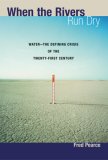Summary | Excerpt | Reviews | Beyond the Book | Readalikes | Genres & Themes | Author Bio

Critics' Opinion:
Readers' Opinion:
First Published:
Mar 2006, 320 pages
Paperback:
Mar 2007, 336 pages
 Book Reviewed by:
Book Reviewed by:
BookBrowse Review Team
Buy This Book
Rivers so often define our world. Is there a better book about America than Huckleberry Finn's journey on the Mississippi? Is there a better way of seeing London than taking a boat down the Thames to Greenwich? Some of the greatest human adventures have been along rivers: up the Orinoco to find El Dorado; or the search for the source of the Nile. Millions of Indians keep bottles of Ganges water in their homes, like holy water. We romance on the Blue Danube and the Seine; and fight over the Jordan and the rivers of Babylon. Yet something disturbing is happening.
The maps in an atlas no longer accord with reality: inland seas and lakes are disappearing; the old geography lessons about how rivers emerged from mountains, gathered water from tributaries and finally disgorged their bloated flows into the oceans are now fiction. Some of the great rivers of the world are disappearing: the Nile in Egypt, the Yellow River in China, the Indus in Pakistan, the Colorado and Rio Grande in the US - all trickling into the sand, sometimes hundreds of miles from the sea. Few of us realise how much water it takes to get us through the day. On average, we drink around five litres of the stuff. Including water for washing and for flushing the toilet, western Europeans use only about 150 litres each. In some countries suburban lawn sprinklers, swimming pools and sundry outdoor uses can double that figure. Typical per-capita water use in suburban Australia is 350l and in the US around 400l.
We can all save water in the home. But laudable though it is to take a shower rather than a bath, put a brick in the lavatory cistern and turn off the tap while brushing our teeth, we shouldn't get hold of the idea that regular domestic water use is what is really emptying the world's rivers.
Manufacturing the goods that fill our homes consumes a certain amount, but that is not the real story either. It is only when we add in the water needed to grow what we eat and drink that the figures really begin to soar. The numbers are mind-boggling: it takes between 2,000 and 5,000l of water to grow one kilo of rice. That is more water than many households use in a week. For just a bag of rice.
It takes 1,000l to grow a kilo of wheat, and 500l for a kilo of potatoes. When you feed grain to livestock for animal products such as meat and milk, the figures become yet more startling. It takes 11,000l to grow the feed for enough cow to make a quarter-pound hamburger; and between2,000 and 4,000l for that cow to fill its udders with a litre of milk. Cheese? A kilo of cheddar or brie takes about 5,000l.
As a typical meat-eating, milk-guzzling westerner, I consume as much as a hundred times my own weight in water every day. It is time, surely, to preach the gospel of water conservation - but don't buy one of those T-shirts with jokey slogans such as "Save water - bath with a friend". Good message, but you could fill 25 bath tubs with the water needed to grow the 250 grams of cotton used to make the shirt. Globalised markets mean that whenever you buy a T-shirt made of Pakistani cotton, eat Thai rice or drink coffee from Central America, you are influencing the hydrology of those regions - taking a share of the river Indus, the Mekong or the Costa Rican rains. You may be helping rivers run dry. The consequences are with us already. Back in Texas, the El Paso Times regularly alerts readers to the days when they can use public water on lawns, and the days they can't.
Jittery suburbanites are repairing old wells in the hope of capturing some private water from beneath their land. And in the unplanned shanty-town "colonias", where many Mexicans end up after crossing the river, thousands of people live without access to piped water at all - and that is a shock to find in the US, even in the desert. El Paso is buying up properties from local farmers to bag their rights to underground water reserves. Its "water ranches" are dotted all along the highway to Presidio, to exploit the subterranean aquifers - natural reservoirs of water trapped between layers of rock. But water-ranching will be only a temporary solution. The region's major aquifer, which lies beneath a vast area of Texas, New Mexico and the Mexican Chihuahua desert, is rapidly running dry because there is not enough rain to replace what is pumped out.
This is an edited extract from When Rivers Run Dry, by Fred Pearce, published by Beacon Press.




Too often we enjoy the comfort of opinion without the discomfort of thought.
Click Here to find out who said this, as well as discovering other famous literary quotes!
Your guide toexceptional books
BookBrowse seeks out and recommends the best in contemporary fiction and nonfiction—books that not only engage and entertain but also deepen our understanding of ourselves and the world around us.